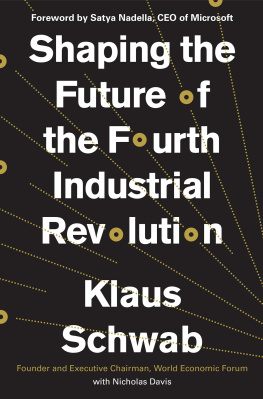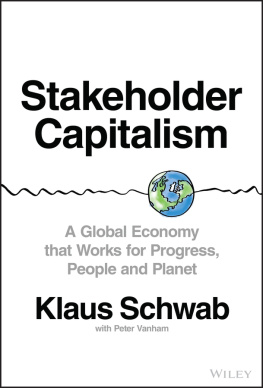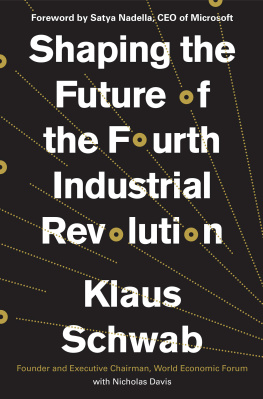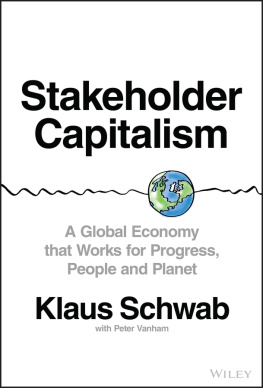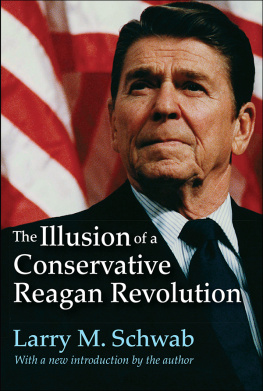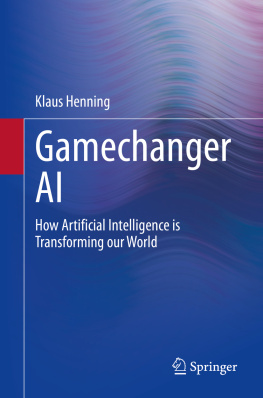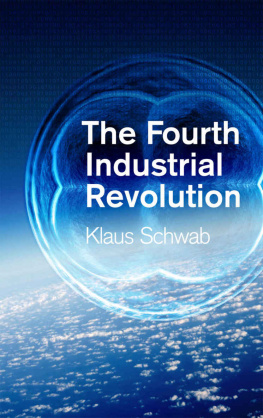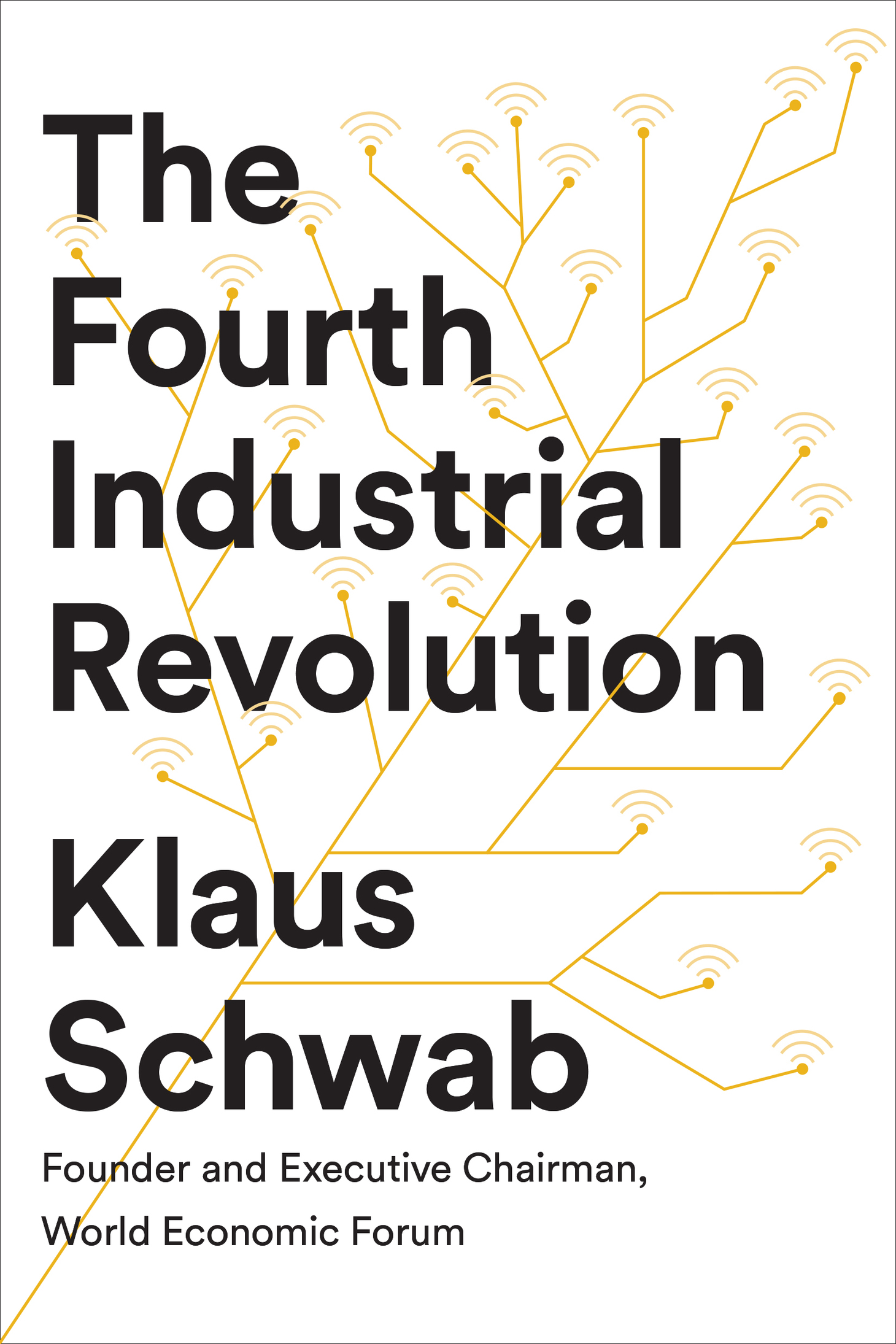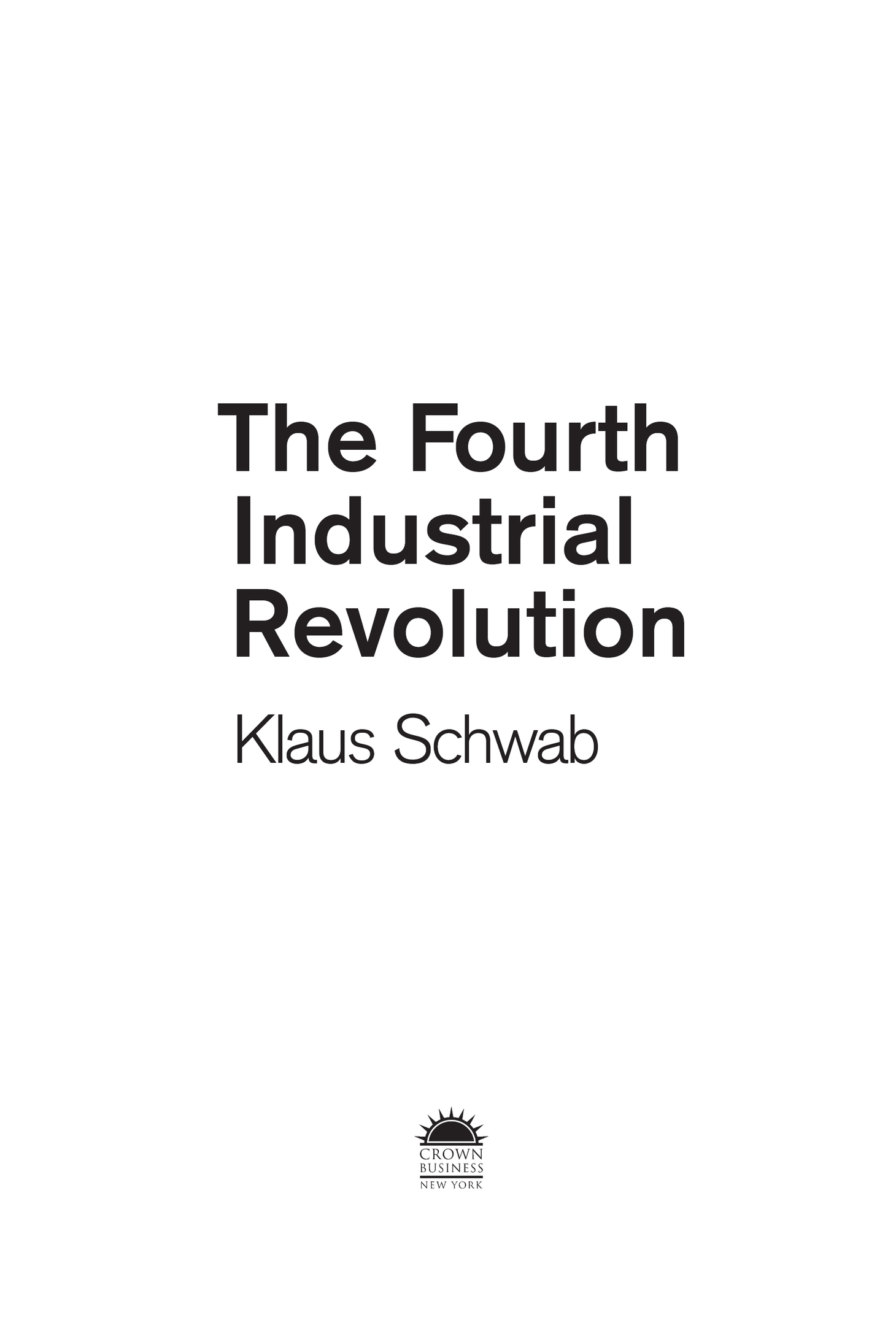Foreword copyright 2017 by Marc R. Benioff
All rights reserved.
Published in the United States by Crown Business, an imprint of the Crown Publishing Group, a division of Penguin Random House LLC, New York.
CROWN BUSINESS is a trademark and CROWN and the Rising Sun colophon are registered trademarks of Penguin Random House LLC.
Originally published by World Economic Forum, Geneva, Switzerland, in 2016.
Names: Schwab, Klaus, 1938, author.
Title: The fourth industrial revolution / Klaus Schwab.
Description: First edition. | New York: Crown Business, [2017] | Includes bibliographical references.
Subjects: LCSH: Technological innovationsEconomic aspects. | Technological innovationsSocial aspects. | Technology and civilization.
Foreword
We live in exciting times of fundamental technological change. The pace and scope of groundbreaking scientific and technological advances coming from research facilities, start-ups and large organizations never cease to amaze me. The science fiction of yesterday is today becoming a reality in new products and services that we wont be able to imagine having lived without.
These rapid advances in technology, however, are doing more than providing us with new capabilitiesthey are changing the way we live, work and relate to one another. As Klaus Schwab describes in this timely and insightful book, the convergence of digital technologies with breakthroughs in materials science and biology means that we are seeing the emergence of entirely new ways in which to live. In both subtle and explicit ways, technology is also changing what it means to be human.
As the Founder and Executive Chairman of the World Economic Forum and its internationally renowned annual meeting in Davos, Switzerland, Klaus Schwab is uniquely placed to synthesize the experiences and views of leading global economic and technological experts, leaders of the worlds largest businesses and the perspectives of government and civil society representatives into panoramic view of the challenges ahead.
He points out that the three previous industrial revolutions all created major societal change and opportunity, but todays transformation is unique in terms of the great speed with which new ideas and technologies are spreading around the world. Every company across every industry is now compelled to reconsider their traditional ways of doing business to keep pace with rapidly changing technology and consumer expectations.
In the coming decades, the technologies driving the fourth industrial revolution will fundamentally transform the entire structure of the world economy, our communities and our human identities. These profound changes highlight the great responsibilities we face as a civilization. We have to make choices and contribute as citizens, government officials and business leaders to design systems that ensure benefits and risks are carefully weighed and new systems arise with common values and clear purposes in mind that benefit everyone on our planet. In all cases, particularly with artificial intelligence, genetic engineering and other technologies that could conceivably escape our control, we need to take care in building systems that minimize risks and improve the human condition.
The Fourth Industrial Revolution is an important book for understanding the major trends shaping our world. It provides a way of thinking and analyzing the historic changes taking place so that we can collectively create an empowering, prosperous, human-centered future for all. I am sure that you will gain valuable insights for navigating the future from reading this fascinating book.
Marc R. Benioff, Chairman and CEO, Salesforce, and a member of the World Economic Forum Board of Trustees
Introduction
Of the many diverse and fascinating challenges we face today, the most intense and important is how to understand and shape the new technology revolution, which entails nothing less than a transformation of humankind. We are at the beginning of a revolution that is fundamentally changing the way we live, work, and relate to one another. In its scale, scope and complexity, what I consider to be the fourth industrial revolution is unlike anything humankind has experienced before.
We have yet to grasp fully the speed and breadth of this new revolution. Consider the unlimited possibilities of having billions of people connected by mobile devices, giving rise to unprecedented processing power, storage capabilities and knowledge access. Or think about the staggering confluence of emerging technology breakthroughs, covering wide-ranging fields such as artificial intelligence (AI), robotics, the internet of things (IoT), autonomous vehicles, 3D printing, nanotechnology, biotechnology, materials science, energy storage and quantum computing, to name a few. Many of these innovations are in their infancy, but they are already reaching an inflection point in their development as they build on and amplify each other in a fusion of technologies across the physical, digital and biological worlds.
We are witnessing profound shifts across all industries, marked by the emergence of new business models, the disruption of incumbents and the reshaping of production, consumption, transportation and delivery systems. On the societal front, a paradigm shift is underway in how we work and communicate, as well as how we express, inform and entertain ourselves. Equally, governments and institutions are being reshaped, as are systems of education, healthcare and transportation, among many others. New ways of using technology to change behavior and our systems of production and consumption also offer the potential for supporting the regeneration and preservation of natural environments, rather than creating hidden costs in the form of externalities.
The changes are historic in terms of their size, speed and scope.
While the profound uncertainty surrounding the development and adoption of emerging technologies means that we do not yet know how the transformations driven by this industrial revolution will unfold, their complexity and interconnectedness across sectors imply that all stakeholders of global societygovernments, business, academia, and civil societyhave a responsibility to work together to better understand the emerging trends.
Shared understanding is particularly critical if we are to shape a collective future that reflects common objectives and values. We must have a comprehensive and globally shared view of how technology is changing our lives and those of future generations, and how it is reshaping the economic, social, cultural and human context in which we live.
The changes are so profound that, from the perspective of human history, there has never been a time of greater promise or potential peril. My concern, however, is that decision makers are too often caught in traditional, linear (and nondisruptive) thinking or too absorbed by immediate concerns to think strategically about the forces of disruption and innovation shaping our future.


